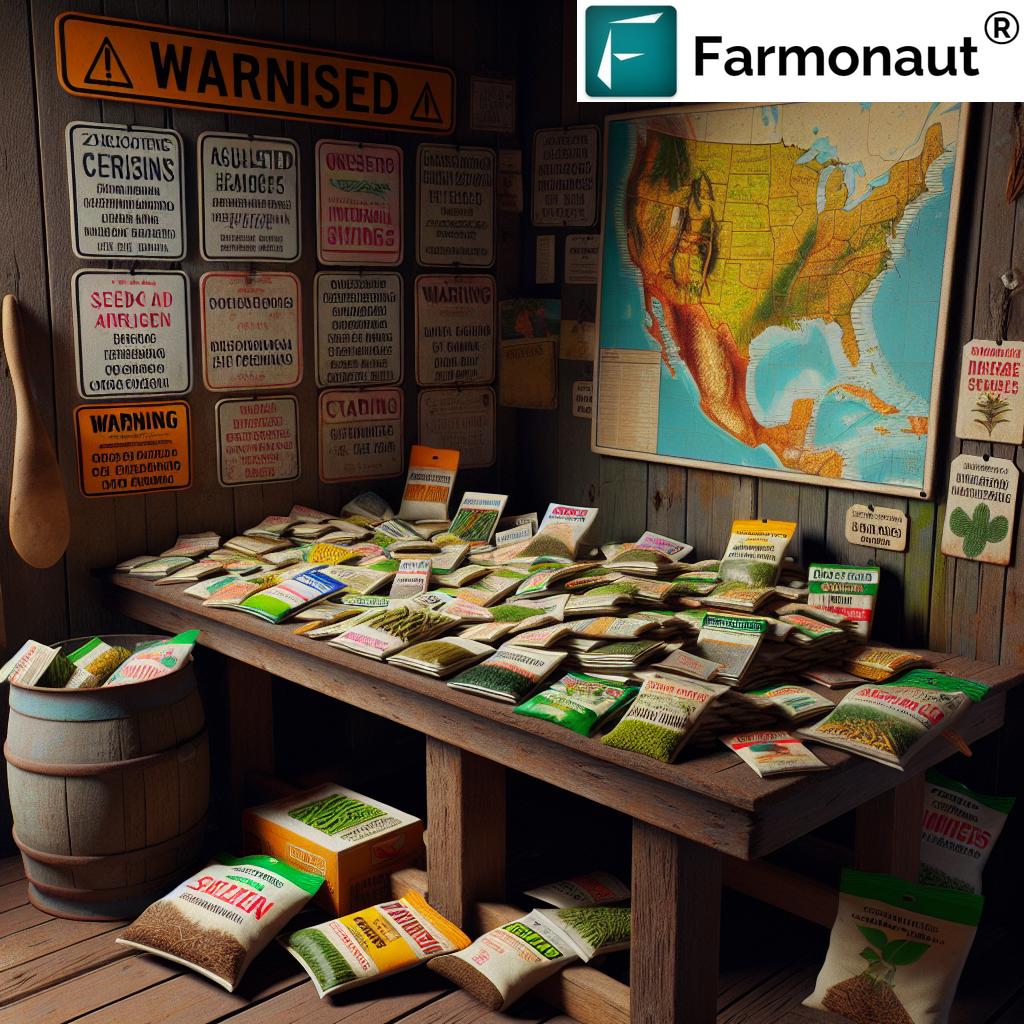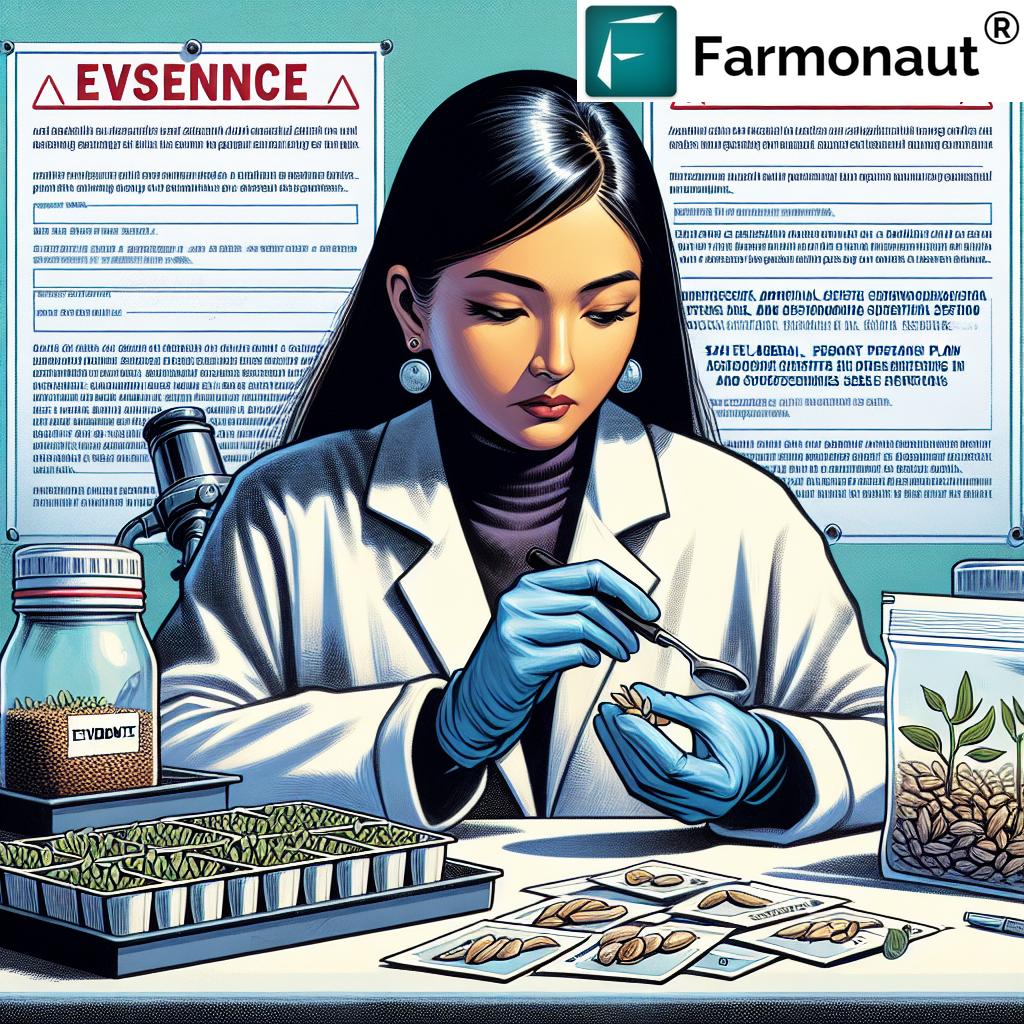New Mexico and Texas: 7 Dangers of Unsolicited Foreign Seeds
“Over 1,000 unsolicited foreign seed packages were reported in Texas and New Mexico in a single year.”
Table of Contents
- Introduction
- Nature of the Threat: Unsolicited Foreign Seed Packages
- Background: Previous Incidents & Growing Risks
- The 7 Main Dangers of Unsolicited Foreign Seeds
- Impact Assessment Table for Unsolicited Seeds in New Mexico and Texas
- Legal Implications and Regulations
- Immediate Actions: What Recipients Should Do
- Reporting Unsolicited Seed Packages: Contacting NMDA and TDA
- Technology and Biosecurity: Modern Tools for Prevention
- Farmonaut’s Role in Sustainable Agriculture and Biosecurity
- FAQ: Unsolicited Seeds in Texas and New Mexico
- Conclusion: Keeping the U.S. Southwest Safe
Introduction
In early 2025, residents of New Mexico and Texas reported the sudden arrival of unsolicited seed packages—envelopes containing foreign seeds of unknown origin—on their doorsteps. The nature of these unexpected shipments has left many citizens concerned about the risks they pose to local agriculture, native plants, and the environment. Until recently, many of us may have overlooked the significant threat such mysterious packages can introduce, but as authorities scramble to protect our ecosystems and agricultural livelihoods, the situation demands attention, vigilance, and immediate action.
To help our communities in New Mexico and Texas understand the full scope of the challenge, this article explores the 7 major dangers of unsolicited foreign seeds. We’ll examine the nature of the threat, its ecological and economic impacts, legal implications, prevention strategies, and the powerful role technology—like Farmonaut’s satellite-based solutions—can play in agricultural biosecurity measures. We’ll also offer clear reporting guidelines for recipients and spotlight practical steps to keep our farms, families, and future safe from invasive plant species risks.
Nature of the Threat: Unsolicited Foreign Seed Packages
What exactly makes these unsolicited foreign seeds in the mail so hazardous? Let’s delve into the nature of the threat and the multiple ways these packages can undermine our local ecosystems, agriculture, and native species.
Unknown Origin & Unclear Labels
Many of these seed packets are labeled incorrectly, sometimes even disguised as jewelry, toys, or other goods. Because of the unknown origin and ambiguous labels, authorities can’t readily determine whether they pose a direct threat. With no safeguards in transit, they bypass the critical regulations meant to prevent the introduction of harmful species and plant diseases.
- Unidentified seeds can carry serious plant pathogens and pests.
- Non-native seeds can introduce invasive plant species that outcompete local flora.
- There is a risk of crop contamination and the spread of noxious weeds.
Ecological Consequences of Planting Unknown Seeds
When recipients unknowingly plant these foreign seeds, it opens the door to a cascade of ecological consequences. The introduction of a single invasive species can disrupt meticulously balanced habitat structures, outcompete native flora, reduce local biodiversity, and even cause economic losses to farming communities by diminishing crop yields.
- Wildlife habitat loss: Many species rely on specific native plants for food and shelter.
- Increased pest management: New pests and weeds lead to more herbicide and pesticide use, increasing costs and environmental risks.
- Agricultural biosecurity measures may be compromised, putting the region’s reputation and exports at risk.
It’s not just our agriculture and ecosystems that are at stake—unsolicited seeds can endanger public health by harboring unfamiliar toxins or allergens, and threaten critical international trade if U.S. agricultural exports become contaminated.
Background: Previous Incidents & Growing Risks in New Mexico and Texas
The issue of unsolicited foreign seed packages is not new. In 2020, a wave of mysterious seeds—many shipped from China and Southeast Asia—were reported in mailboxes across the United States, with significant clusters in New Mexico and Texas.
- In New Mexico: Authorities identified 224 seed packets, 4 of which were classified as noxious weeds threatening native ecosystems (hpj.com).
- In Texas: Agriculture Commissioner Sid Miller issued widely publicized warnings after hundreds of packages were found to be falsely labeled as “jewelry” (texasagriculture.gov).
Authorities in both states highlighted the potential risks of invasive introductions and asked recipients not to dispose of or plant the seeds, but instead to report any suspicious seed packets for safe examination by the NMDA Laboratory Division or TDA.
The Brushing Scam: Potential Motivations Behind the Shipments
The mystery behind these foreign seed shipments is ongoing. One prominent theory is “brushing”—a fraudulent practice where sellers ship products to random addresses to artificially inflate their own feedback and online review scores. As Phylissia Clark of the Better Business Bureau explained, individuals who receive such unsolicited seeds should also check for identity theft or misuse of their address information (nbcdfw.com).
“Invasive plant species cost U.S. agriculture over $13 billion annually in damages and control efforts.”
The 7 Main Dangers of Unsolicited Foreign Seeds in New Mexico and Texas
To fully appreciate the gravity of unsolicited foreign seed packages, let’s break down the seven primary threats these shipments present to the environment, agriculture, and our communities:
1. Spread of Invasive Plant Species
Unsolicited foreign seeds can introduce invasive plant species that rapidly outcompete native plants. Once established, they are nearly impossible to eradicate and can quickly dominate agricultural fields and wildlands, disrupting ecosystem balance.
2. Crop Contamination & Reduced Yields
Cross-pollination or contamination from unknown foreign plants may reduce crop yields and quality. Farmers—especially in fragile environments like New Mexico and West Texas—can suffer economic losses, with ripple effects on local farming communities.
3. Introduction of Plant Diseases & Pests
Some seed packets may carry plant diseases, fungi, bacteria, or insect eggs. Introducing new pests or diseases into U.S. agriculture or wild flora poses a grave and unpredictable risk, potentially requiring costly new pest management protocols.
4. Harm to Native Plants & Loss of Biodiversity
Native species in New Mexico and Texas—from blue grama grass to rare desert wildflowers—are finely adapted to local conditions. Foreign species often outcompete these natives, causing a marked decline in biodiversity and threatening wildlife habitats.
5. Disruption of Ecosystem Structures
Invasive plants can alter soil chemistry, disrupt water cycles, and affect entire habitat structures, making it difficult for native wildlife to survive. These changes are particularly severe in arid and semi-arid ecosystems found across northern Mexico, New Mexico, and Texas.
6. Economic Impact on Farming Communities
The costs of managing outbreaks—ranging from increased herbicide use to lost crops—mount quickly. Unchecked introductions of foreign plant material can devastate farming communities, reduce profitability, and require long-term government intervention.
7. Legal and Regulatory Complications
The unauthorized importation of seeds is illegal under numerous state and federal laws. Ignoring reporting procedures or planting unknown foreign seeds could trigger penalties—both for individuals and for industries affected by subsequent biological outbreaks.
Impact Assessment Table for Unsolicited Seeds in New Mexico and Texas
To highlight the scope and scale of these dangers, here’s an impact assessment table summarizing each major threat, estimated risks, affected area, and practical steps you can take:
| Danger Description | Estimated Risk Level | Potentially Affected Area | Estimated Economic Impact (USD) | Impact on Native Species | Recommended Action |
|---|---|---|---|---|---|
| Spread of invasive plant species | High | 1.5–2 million acres (TX & NM combined) | $8–10 billion annually | 30–50% decline in population/coverage | Immediate reporting; do not plant seeds |
| Crop contamination & reduced yields | High | Up to 20% of agricultural land | $1.5–2.2 billion per season | 20–30% crop yield reduction | Preserve evidence; inform authorities |
| Introduction of plant diseases & pests | Medium-High | Entire state regions if unmanaged | $500 million–$2 billion (outbreak costs) | Severe outbreaks: 1–2 threatened species | Photograph/document; mail to NMDA/TDA |
| Harm to native plants & biodiversity | High | Most grasslands & wilderness parks | Ecosystem restoration: $1 billion+/yr | Up to 40% loss in sensitive habitats | Contact NMDA/TDA; public education |
| Disruption of ecosystem structures | Medium | Wetlands, arid basins, river corridors | Unquantified, but critical for resilience | Altered by up to 50% in certain areas | Awareness campaigns; habitat monitoring |
| Economic impact on farming communities | High | Agricultural counties throughout NM & TX | $3–5 billion annually | Decline in supporting pollinators/beneficials | Early detection/reporting; crop monitoring |
| Legal & regulatory complications | Medium-High | Any area with non-compliant individuals | Penalties up to $250K/violation (federal) | Variable—regulatory restrictions enforced | Don’t engage with/plant seeds; legal reporting |
Legal Implications and Regulations: Preventing Agricultural Diseases & Invasives
The legal implications of unauthorized importation of seeds into the United States—including into Texas and New Mexico—are clear and severe. Federal and state laws exist to prevent the introduction of dangerous foreign species, plant pathogens, and other agricultural threats:
- The Plant Protection Act (PPA): Regulates the movement of plants and seeds into and within the U.S.; prohibits unauthorized imports without appropriate phytosanitary certificates.
- State Laws (NMDA & TDA): Both states have local regulations to restrict the entry of non-native seeds and protect local ecosystems and agricultural production.
- Penalties: Engaging in the importation or planting of unauthorized seeds can result in fines of up to $250,000, criminal prosecution, and civil penalties.
Anyone reporting suspicious seed packets and following established protocols protects both themselves and the wider community against these legal and environmental risks.
Immediate Actions: What Recipients Should Do with Unsolicited Seeds
Authorities in both Texas and New Mexico urge recipients to follow these steps to prevent the accidental introduction of invasive plant species:
- Do not plant the seeds.
Even seeds that appear harmless can disrupt local agriculture and natural habitats if they sprout. Never eat, plant, or compost them. - Retain all materials.
Keep the seeds, packets, packaging, and labels intact—these details are key for laboratory identification and potential legal tracing. - Document the package.
Take clear photographs of the foreign seed packets and all packaging from multiple angles. This helps in rapid investigation and risk assessment. - Contact appropriate authorities immediately.
Do not discard or destroy the seeds—report your findings to the agencies below (see next section).
Reporting Unsolicited Seed Packages: Contacting NMDA and TDA
Take these steps to formally report and prevent the spread of invasive species:
-
New Mexico (NMDA):
- Email: ddlabs@nmda.nmsu.edu (with photos attached)
- Phone: 575-646-1551
- Fill out: NMDA’s Unsolicited Seed Package Form
- Mail seeds & packaging to:
New Mexico Department of Agriculture
Laboratory Division
Attn: Tim Darden
MSC 3 LD / P.O. Box 30005
973 Agriculture Way
Las Cruces, NM 88003-8005
-
Texas (TDA):
- Phone: 1-800-835-5832
- Read more at Texas Department of Agriculture
Technology and Biosecurity: Modern Tools for Preventing Agricultural Threats
Protecting local agriculture and ecosystems from invasive plant species risks is no longer just about vigilance at borders. Modern agricultural biosecurity measures use data, artificial intelligence, and satellite monitoring to detect, track, and respond to threats rapidly.
- Satellite-based crop health monitoring: Detects early outbreaks, changes in field cover, or unusual plant growth patterns that may signal non-native species or diseases.
Learn how this technology empowers farm managers at Farmonaut Large-Scale Farm Management. - AI-driven advisory and rapid alerts: Systems like Farmonaut’s Jeevn AI help deliver timely strategies for pest or weed management, vital in response to new introductions.
- Blockchain-based traceability: Critical for verifying the origin of agricultural inputs and ensuring secure, compliant seed supply chains. This transparency is key to preventing agricultural diseases and illicit imports.
Explore traceability benefits at Farmonaut Product Traceability. - Resource & fleet management: When outbreaks occur, coordinated response is crucial. Fleet management tools help authorities mobilize teams to affected areas. Read more about Farmonaut Fleet Management.
- Carbon footprinting: Invasive species and the chemicals used to control them can increase a farm’s environmental impact. Monitoring emissions and sustainability metrics is now possible with Farmonaut Carbon Footprinting Solutions.
Farmonaut’s Role in Sustainable Agriculture and Biosecurity
At Farmonaut, we are passionate about protecting local agriculture, native species, and promoting sustainability through innovative technology. Our precision agriculture platform harnesses satellite imagery, AI, and blockchain to empower farmers, agribusinesses, and policymakers in New Mexico, Texas, and beyond.
Farmonaut helps farming communities and regulators:
- Monitor and optimize crop health across diverse regions.
- Detect early signs of crop stress that could signal invasive species or disease outbreaks.
- Advise growers on the best resource allocation—saving water, fertilizer, and time.
- Trace the journey of agri-products throughout supply chains, ensuring compliance and transparency. Useful for regulatory needs—see details at Farmonaut Product Traceability.
- Reduce carbon emissions using accurate field-level data—discover our carbon footprinting tools.
- Support insurance, loan verification, and disaster-response teams through accurate, real-time crop monitoring. Read more about Farmonaut Crop Loan and Insurance.
By integrating Farmonaut’s accessible tools and agricultural biosecurity measures, we can build resilient communities—ones that quickly identify and counter the impact of unsolicited foreign seeds and other environmental threats.
FAQ: Unsolicited Seeds in Texas and New Mexico
What should I do if I receive an unsolicited foreign seed package in the mail?
Do not plant the seeds. Preserve the packaging, take photos, and immediately report to the New Mexico Department of Agriculture (NMDA) or Texas Department of Agriculture (TDA) using their contact channels.
Why are unsolicited seeds a threat to agriculture and ecosystems?
Because they may introduce invasive plant species, crop diseases, pests, or outcompete native flora. These can lead to economic losses, food security risks, and long-term environmental damages.
Can I compost or throw away the seeds?
No. Disposing of seeds in the trash or compost may inadvertently allow them to germinate or spread. Always follow the reporting and mailing instructions provided by NMDA or TDA.
Are these seed shipments illegal?
Yes. Unauthorized importation of seeds without inspection breaches state and federal laws, carrying penalties and enforcement actions.
How can technology help prevent the spread of invasive species?
Technologies like satellite monitoring, AI-driven advisory, blockchain traceability, and carbon footprinting are critical for early detection, rapid response, and ecosystem management. Platforms like Farmonaut enable these functions, empowering farmers, researchers, and authorities alike.
Conclusion: Keeping New Mexico and Texas Safe from Invasive Seeds
In summary, the surge in unsolicited foreign seed packages across New Mexico and Texas highlights the ongoing need for vigilance in agriculture and ecosystem management. With the right reporting procedures, advanced technology, and community awareness, we can collectively guard against the impact of invasive species on ecosystems and protect our native plants and agricultural livelihoods for generations to come.
Let’s all do our part: report suspicious seed packets, educate our communities, and adopt the best agricultural biosecurity measures available. If you’re an agricultural professional, regulator, or farmer in New Mexico, Texas, or anywhere facing similar threats, leverage Farmonaut’s technological solutions for real-time monitoring, traceability, and sustainability.
Together, through science, vigilance, and innovation, we can prevent the introduction and spread of invasive plant species—safeguarding our land, communities, and future.














